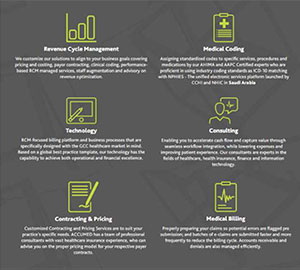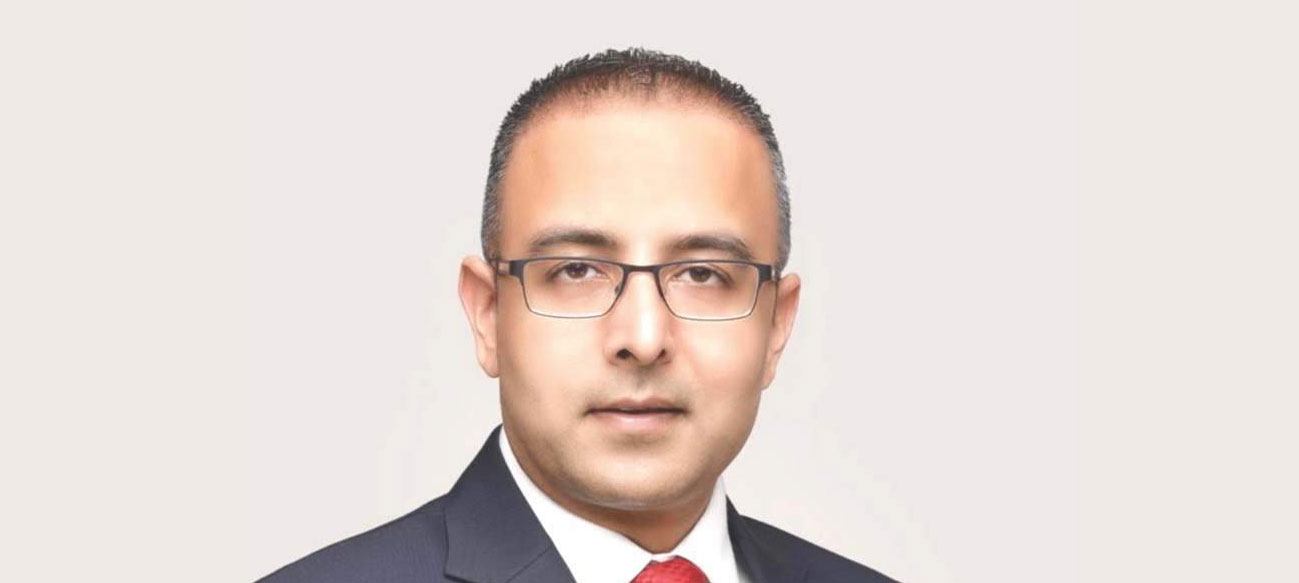“RCM has a critical role, not just in a healthcare organization, but also at a macro level. At an organization level, RCM directly impacts the financial performance of a healthcareorganization in many ways. From a strategic standpoint at individual hospital level, RCM function contributes to shaping the healthcareprovider’s market segmentation and positioning which in turn determines the addressable market size and revenue generation opportunity,” says, Agrawal
revenue cycle management (RCM) is the process healthcare providers use to track patient care, bill patients
and third-party payers for services rendered and receive payment for services. The RCM process begins when the
patient is seen by a healthcare provider and ends when the provider is paid for the services provided.
There are a number of steps in the RCM process, which can be categorized into three main areas: pre-billing, billing, and post-billing.

Pre-billing refers to the steps providers take before billing a patient or thirdparty payer for services rendered. This includes creating an accurate patient r e c o r d , o b t a i n i n g r e q u i r e d authorizations for services, and ensuring that services are billed correctly.
Billing refers to the process of submitting a claim for payment to a patient or third-party payer. This includes submitting claims in a timely manner, correctly coding services, and s u b m i t t i n g a l l r e q u i r e d
documentation.
Post-billing refers to the steps providers take after billing a patient or third-party payer for services rendered.
This includes following up on unpaid claims, resolving billing disputes, and collecting on past-due bills.
Healthcare Revenue Cycle Management Market size exceeded $110 billion in 2021 and is expected to witness over 12.7% CAGR from 2022 to 2028. The HRCM market is anticipated to grow exponentially owing to the increasing patient admissions and growing healthcare expenditures. Also, technological advancements in HRCM solutions have surged the demand for revenue cycle management systems for efficient data management (Global Market Insights).
RCM is an important part of the healthcare industry, and healthcare providers rely on accurate and timely billing information to ensure that they are paid for the services they provide. However, the RCM process can be complex and time-consuming, and providers often need to rely on third-party vendors to help them manage their billing operations.
Amit Agrawal, Senior Director of Operations, Accumed discusses with Ayesha Rashid of Mediworldme
What is revenue cycle management?
Revenue Cycle Management (RCM) is an extremely important function in hospitals and other healthcare service providers directly impacting revenue generation and cash ow management. RCM function encompasses all administrative and clinical processes from the time a patient schedules a visit to a healthcare provider until the latter receives payment for services rendered. The goal of the RCM process is multi-fold and includes: enhancing patient experience during the entire journey of clinical care, maximizing claims reimbursement and revenue, improving cash ow and ensuring regulatory compliance.
Why is RCM important in the healthcare organization?
RCM has a critical role, not just in a healthcare organization, but also at a macro level. At an organization level, RCM directly impacts the nancial performance of a healthcare organization in many ways.
From a strategic standpoint at individual hospital level, RCM function contributes to shaping the healthcare provider’s market segmentation and positioning which in turn determines the addressable market size and revenue generation opportunity.
Operationally, RCM helps in optimizing revenue generation by ensuring the hospital prices its services appropriately and instilling proper process management of billing and collections from payors of healthcare services. Additionally, an effective RCM function aids in shortening the cash cycle thereby lowering the organizations’ cost of capital.
Lastly, RCM helps by providing insightful data and analysis allowing healthcare organizations to assess its nancial performance, identify risks, make critical decisions, and take necessary corrective actions that aid right decision making. The data and insights are of importance not just at hospital level, but also at national healthcare system level as it enables stakeholders understand the healthcare needs of the population today and in future, and ensure readiness to meet these needs.
 How does RCM unify business and clinical sides of healthcare?
How does RCM unify business and clinical sides of healthcare?
R C M b r i n g s t o g e t h e r n u m e r o u s administrative data points, such as patient information, insurance provider details and nancial aspects, regarding the type, quantity and cost of services availed by the
patient, and nancial settlement for rendered services.
RCM functions deploy effective set of processes and technology to enable coordination, ow, and collation of essential administrative data across a complex ecosystem comprising of front desk operators, physicians, labs, nurses, pharmacists, billing, collections and so on. This ensures the patient receives the right service at the right time, insurance and other healthcare payors receive accurate and timely information for their administrative purposes, and healthcare organizations bill and receive appropriate and timely remuneration.
You mentioned that ‘today’s healthcare centers struggle with keeping operational costs down and thus it is vital to receive payments from patients and insurance companies in a timely manner to keep prots up? Tell us about this?
At present, the claims processing and settlement cycle for claims submitted by health care operators take anywhere from 3 months to as long as two years impacting the cash ow, and cost of capital of the hospital or clinic. Some
healthcare providers incorporate the increased cost of capital in form or higher prices.
A robust RCM function aids in lowering capital cost by shortening collection cycles and reducing claim rejection rates as it ensures the information provided to the insurance company is accurate, relevant and on time, so the claim is processed without delays. Lower operating cost empowers healthcare providers lower prices benetting payors of healthcare services and patients.
Moreover, establishing a robust RCM function requires healthcare providers to make signicant investment in people, processes, and technology. These investments also contribute to the driving cost of healthcare services. ACCUMED
has invested in creating such a platform that takes away the need for healthcare providers to make similar investments and they can therefore channel resources to provide better healthcare services.
Tell us in detail about ACCUMED?
Established in 2009, Accumed was the rst company to provide specialist RCM solutions in the UAE and the GCC region at a time where the healthcare system in the UAE was embarking on a transformation driven by the country’s visionary leadership. Since then, ACCUMED has created a legacy of enabling healthcare providers to optimize nancial performance. We are sensitive to the point healthcare is unique, so we listen and understand their challenge, and design custom solutions that are relevant, practical and scalable within the operating environment of the organization. We are the rst, and to the best of my knowledge, the only RCM provider in the region with ISO 9001:2015 certication which is a testimony of our capabilities and approach.
ACCUMED has worked with both private and governmental healthcare providers in the UAE. Clients include Abu Dhabi Ambulance services, Saudi German Hospitals Group, Mediclinic Group, Medcare, Gulf International Cancer Center and the Cleveland Clinic Abu Dhabi, among others.
Originating in the UAE, we have quickly expanded into KSA, followed my international markets such as India and Australia. While Accumed is committed to supporting healthcare providers, they are also focused on guiding healthcare regulators transform healthcare systems at national levels.
How do you aim to standardize and improve quality of data at a macro level?
Every patient and their health conditions are unique. As a result, data related to each patient and their health is different to that of other patients. However, analyzing trends – types of ailments and diseases, frequency and severity, patient demographics etc. – to ensure healthcare system is prepared to address evolving needs of the community requires data to be structured and standardized.
As a specialist provider of RCM services, ACCUMED helps healthcare operators in providing this structure by leveraging its deep knowledge, systems and tools to apply international standards for classifying various types of data – patient demographics, diseases, services, medications and so on – starting at hospital level which gets
aggregated at macro level.
Additionally, in KSA for example, ACCUMED has assisted The Ministry of Health in designing a unique framework for standardizing and coding healthcare services in the Kingdom. The framework is being implemented for provision of healthcare services in both the private and public healthcare service organizations.
Why is RCM a necessity in the Middle East?
In mature markets such as North America, RCM has become one of the most prominent functions for healthcare providers to outsource, mainly due to combination of complexity and critical importance. In the Middle East, RCM still remains at a nascent stage, however, its prospects are bright as the region’s healthcare market holds untapped potential.
The Middle East healthcare market is also evolving with new regulations, laws, systems, processes, and nancial dynamics, making RCM a cornerstone in the healthcare industry. UAE and KSA are leading the way. Rest of the GCC members are also embarking on transforming their healthcare systems. Bahrain, Oman and Qatar are expected to introduce mandatory health insurance in the near future, so are the northern emirates of UAE.
This is over and above the evolution taking place in more advanced healthcare systems such as Dubai, Abu-Dhabi and KSA.
These are very complex initiatives requiring substantial changes within operations of healthcare operators and insurers. Thus an effective and efficient RCM capability is a necessity.
How will RCM help UAE in the future?
The UAE healthcare sector is growing at an increasing rate where the overall healthcare spending was 4.27% of GDP in 2018 which is projected to rise to 4.6% by 2026 and 5.1% by 2029 respectively. The evolution of new systems, processes, laws and regulations and nancial dynamics in the industry makes RCM a cornerstone in the UAE healthcare
market.
Effective RCM can help hospitals potentially save millions of dirhams. It empowers health care providers to focus on their core competency, which is to provide quality healthcare to every patient, while the RCM process takes care of the other factors in a cost-effective manner. Systems such as those provided by Accumed, spare healthcare providers spending thousands on the required technology, training staff and process efficiency. It’s all about economy of scale.
The industry-wide transition from free for service to value-based care reimbursement bring changes to traditional RCM. Your opinion?
In my opinion transition to value-based care is still some years away as the healthcare systems are busy putting together the necessary building blocks. Establishing an effective and sustainable VBC framework requires extensive amounts of data and analysis. Hence RCM functions, and organizations like ACCUMED, are already playing a central and pivotal role in the transition journey – ranging from gathering and analyzing data on diseases/ailments,
quality of care, cost of care (viz-a-viz quality), pricing services and so on.
Operationally, as previously mentioned, the present model in healthcare organizations is already very complex due to need for coordination across many stakeholders and touchpoints. VBC will further increase the number of stakeholders in managing a patient. This in turn will increase the challenge and expectations from RCM functions and service providers.














